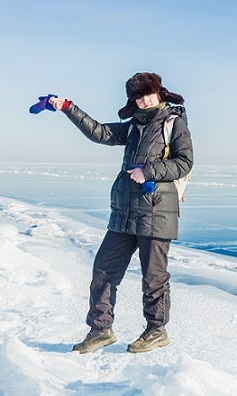Student Profiles
Program alumni are the best resources for students interested in going abroad, and they are available to answer your questions. If you would like to talk to a recent student about their experience in Russia, get in touch with the advisor, Susan Parsons.
Ryland Pitts, Davidson College, Moscow
Living abroad can feel isolating and scary, especially when in a new cultural context and when taking on linguistic challenges. Through contacts I had in Moscow, my program, and my host family, my social life was comfortable. Moscow quickly felt like home for me. I love running long distance, and thanks to my location, I was able to explore large swaths of downtown Moscow on foot. I went to the Russian banya every Friday after class with a friend. There, we made friends with several Russian men who loved talking about politics and history. I also frequented a climbing gym and a coffee shop where there was an electric guitar I would play. Throughout the year, I enjoyed visiting museums, parks, coffee shops, and other cities.
In the Spring semester I interned at Transparency International, where I databased regional corruption in Russia. In between the Fall and the Spring semesters I traveled to Belarus and Lithuania with a research grant from Davidson College to conduct research towards my Senior Thesis, which examines Russian political influence.
With my host parents I watched TV, went on walks, and visited the dacha. We ate breakfast and dinner together, talking about anything and everything. I regularly played jazz and old Russian folk songs on their soviet built piano. I wouldn’t change anything about my host family experience. It was a critical part of language acquisition for me.
The linguistic, cultural, academic, and professional value I gleaned from my year in Russia is immeasurable. Moscow is a city of great cultural, historical, and political significance, and I am privileged to have experienced it so honestly and thoroughly. Russia holds a piece of my heart, and I know it will call me back eventually.

Annie Blalock, Middlebury College, Irkutsk
Irkutsk is located northwest of Lake Baikal, the deepest and cleanest fresh water lake in the world. Throughout the semester our resident coordinator, Ilya, booked weekend trips to different spots around Baikal. One of my favorites was our February trip to Bolshoy Goloustniya.
After a full day of hiking up mountains and traversing across the frozen lake, we returned to our motel and sat down to a dinner of traditional Russian food in the motel’s cozy dining room. About half-way through our dinner our host called our attention to the front of the dining room. We turned around to find her wearing an elaborate Buryati costume and holding a microphone when she queued the karaoke and began belting Russian pop. At this point, exhausted from our day, full on borsht and celebratory toasts, our jaws collectively dropped. After several songs, Ilya proposed a walk outside for those who wanted to escape the free concert. After weighing our choices of walking in -30 degree weather or staying for the show we all get dressed and headed out.
At night the ice on Baikal reflects the black, cloudless sky and appears infinite. We walked onto the ice and a few hundred feet away from the shore. The absence of light pollution and clouds gave way to a sky full of stars. Mesmerized by the vastness of stars, we laid down on the ice and listened to the thunderous cracks of the lake shifting. The endless darkness felt like I had lost of my sense of sight and electrified the feeling of cold on my face and the sounds of ice cracking. Despite the freezing temperature, we must have stayed out there for half an hour. In that moment I learned that living in a place known for its emptiness has its perks.
Alana Felton, Brown University, Yaroslavl
Studying abroad in Yaroslavl was the most exciting, challenging, and formative experiences I have ever had. Yaroslavl is an old city, over 1000 years old. Having grown up in rural Pennsylvania, I had never seen such old buildings or considered that a town could have such a dramatic and long history. This was one of the reasons I decided to study abroad in Yaroslavl. I wanted to go somewhere in Russia that had a history that extended beyond the history of the United States, because I wanted to challenge my perception of time and history.
Due to an independent research project about Russian Orthodoxy I did while abroad, I also wanted to be in Yaroslavl because it is home to one of the oldest dioceses in Russia. I was especially fascinated by the local churches. Most of them are very old, and some are still being rebuilt and renovated after the damage done to them during the Soviet period. I even had the incredible opportunity to experience an all-night Orthodox Easter service in a village outside of the city, because I got to know the priest of that church.
Getting to engage with Russian culture intimately by meeting local students and living with my host mother improved my ability to speak Russian. I was thrilled by how open and friendly most people I met were. I was invited to numerous events, excursions to nearby towns, and club activities. Some of the most enjoyable parts of studying abroad in Yaroslavl were the classes I took at Yaroslavl State Pedagogical University. I especially enjoyed a class about the intersection of Russian language and culture (лингвокультурология) that taught me more about cultural, complex, emotional meanings behind particular words and phrases.
